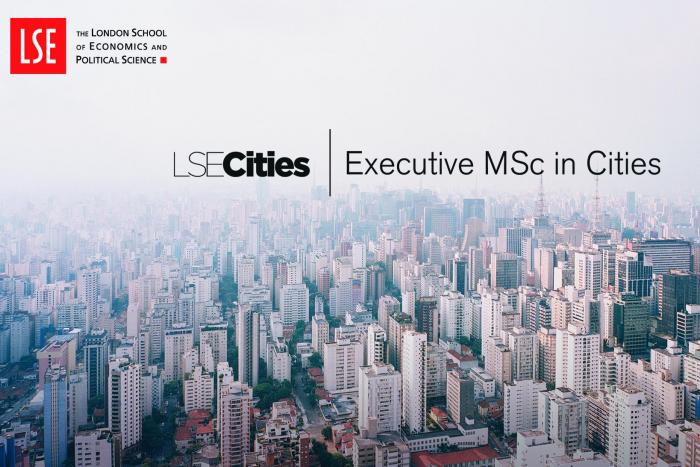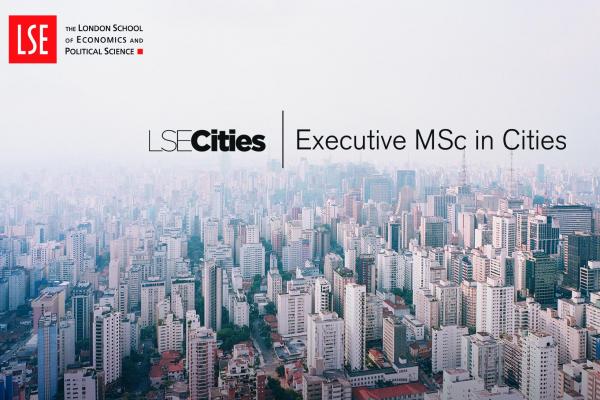
Executive MSc in Cities
Master
In London

Register to the Executive MSc in Cities and enhance your career prospects in the area of public and private urban practice!
-
Type
Master
-
Location
London
-
Duration
18 Months
Emagister adds to its catalogue the Executive MSc in Cities, which is designed for public, private and third sector leaders who want to deliver large-scale change in cities.
Based at LSE Cities, a leading international centre that has informed global urban practice for the last 16 years, we deploy the Centre’s global network of city leaders and the School’s leading urban specialty faculty to put the latest ground-breaking research into business and public action.
The executive programme provides specially-designed interdisciplinary courses focused on applied research and methods, and a modular teaching programme, designed to meet the needs of leading professionals from international, national and metropolitan organisations as well as companies and corporations involved in shaping the urban world.
It delivers an integrated set of executive-level courses that work across complex and connected issues helping you to analyse urban projects and policies from rigorous economic, social and environmental perspectives. You will have the opportunity to interact with highly experienced practitioners from city governments and planning and transport departments, as well as experts from research centres and institutions, development and design professions, urban consultancies and infrastructure providers from the UK and abroad.
If you want to enjoy all these advantages, contact us through emagister.co.uk so we can give you the most relevant information about this course.
Facilities
Location
Start date
Start date
About this course
2:1 degree or equivalent in any discipline or equivalent professional qualification, plus, typically, a minimum of 10 years of professional experience in an urban related public/private/third sector, or another sector. English language requirements: Higher.
The Executive MSc in Cities is a transformational programme that provides skills and knowledge to enhance career prospects and expand options in the area of public and private urban practice. To help accomplish this, it incorporates an integrated leadership programme to equip participants with the skills they need to achieve change within their organisations.
Reviews
Subjects
- Executive
- Planning
- Network Training
- Cities
- Urban Design
- Urban Planning
- Social cohesion
- Economics
- Management Consulting
- Real Estate
- Architecture and Planning
- Public Policy
- Transportation
- Commercial Real Estate
- Government Administration
- Government Relations
Course programme
The Executive MSc in Cities comprises six modules. You will attend LSE for five one-week sessions, over a 12-month period.
The programme also includes a compulsory six-month urban consultancy project, to be undertaken in your own organisation or for an external organisation.
Session datesWeek 1 - The Challenge: 24 - 28 September 2018
Week 2 - Analysis: 10 - 14 December 2018
Week 3 - Strategy: 11 - 15 February 2019
Week 4 - Delivery: 1 - 5 April 2019
Week 5 - Taskforce: 3 - 7 June 2019
Consultancy - Six months: Having consulted for an external organisation in Session 5, you will conduct an internal strategic management project within your own organisation or an organisation.
(* denotes a half unit)
Governing Cities in an Urban Age: Challenges and Opportunities*
Provides an intensive exploration of the global urbanisation and the state of cities. The course introduces different stages of urban development in cities and regions across the world. It provides an understanding of the key challenges facing both mature and rapidly developing metropolitan areas.
Cities and Society: Design and Social Cohesion*
Focuses on some of the major drivers of urban inequality and poverty and the key actions that cities are taking to reduce urban inequalities through urban design, infrastructure and policy. This is a heavily applied course providing you with tools to analyse the socio-demographic profile of households and neighbourhoods and their relation to spatial distribution and clustering in cities of the developing and developed world.
Cities and the Economy: Urban Economic Development and Finance*
An applied course looking at how cities position themselves in a competitive global economy and at the roles of city, government and firms in driving local economic development. The course introduces key methodologies to measure and analyse the city economy as well as policies and tools available to attract investment and finance and improve growth and competitiveness. The course uses case-based challenges, futures and foresight techniques to put economic strategies to the test.
Cities and the Environment: Urban Environmental Transitions*
Explores critical aspects of environmental sustainability in relation to both urbanisation globally and urban change in individual cities. The applied components of the course provide relevant tools to measure, analyse and assess environmental impact and develop environmental strategies. The course introduces debates on different green-city paradigms and focuses specifically on approaches to urban climate change mitigation and adaptation. The course further examines implications for urban planning, governance and management.
Either
Urban Infrastructure and Strategic Planning
A workshop-based course providing practical insights on infrastructure development and strategic planning for cities. The course combines a series of lectures with studio-based group work on a case study city. Students are introduced to all key components of urban infrastructure, cutting across transport, energy, water, waste and digital network systems.
Or
Urban Development and Masterplanning
An applied group project based on a major London regeneration site. Groups of no more than six students will be introduced to one of the regeneration sites project teams which will include: local planning officers, developers, planners, designers and financing teams.
Urban Consultancy Project
A six-month individual consultation undertaken in your own organisation or for an external organisation. Through the consultancy project, you will apply the knowledge and skills acquired in the first six courses of the programme to craft policy or programme improvements for public or private agencies and non-profit organisations. Through in-depth interviews with the organisation’s leaders as well as the relevant stakeholders, you need to focus on a specific project and offer advice on one or more of its design and implementation phases.
You must note however that while care has been taken to ensure that this information is up to date and correct, a change of circumstances since publication may cause the School to change, suspend or withdraw a course or programme of study, or change the fees that apply to it. The School will always notify the affected parties as early as practicably possible and propose any viable and relevant alternative options. Note that that the School will neither be liable for information that after publication becomes inaccurate or irrelevant, nor for changing, suspending or withdrawing a course or programme of study due to events outside of its control, which includes but is not limited to a lack of demand for a course or programme of study, industrial action, fire, flood or other environmental or physical damage to premises.
Teaching methods and assessment
The programme is designed to be suitable for participants in full-time employment so it consists of five modular teaching blocks over 12 months, followed by a six-month consultancy project.
Teaching will be undertaken through a mix of seminars, case challenges, workshops, group work, site visits, presentations and pitches. The modules are assessed by a combination of individual reports, individual and group presentations and the consultancy report.
There are many opportunities to extend your learning outside the classroom and complement your academic studies at LSE. LSE LIFE is the School’s centre for academic, personal and professional development. Some of the services on offer include: guidance and hands-on practice of the key skills you will need to do well at LSE: effective reading, academic writing and critical thinking; workshops related to how to adapt to new or difficult situations, including development of skills for leadership, study/work/life balance and preparing for the world of work; and advice and practice on working in study groups and on cross-cultural communication and teamwork.
LSE is committed to enabling all students to achieve their full potential and the School’s Disability and Wellbeing Service provides a free, confidential service to all LSE students and is a first point of contact for all disabled students.
Additional information
When to apply: Applications for this programme are considered on a rolling basis, meaning the programme will close once it becomes full. There is no fixed deadline by which you need to apply, however to be considered for a scholarship, you must have submitted your application and all supporting documents by the funding deadline. See the fees and funding section for more details.
Every graduate student is charged a fee for their programme. The fee covers registration and examination fees payable to the School, lectures, classes and individual supervision, lectures given at other colleges under intercollegiate arrangements and, under current arrangements, membership of the Students' Union. It does not cover living costs or travel or fieldwork.
Financial support: Urban Age Scholarships (application deadline March 2018).
Executive MSc in Cities

